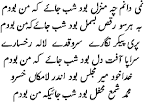A pure magical performance, Nasrat Fateh Ali Khan reciting the great 13th century Sufi mystic and poet, Amir Khusraw's following poem in Farsi:

I wonder what was the place
where I was last night,
All around me were half-slaughtered victims of love,
tossing about in agony.
There was a nymph-like beloved with cypress-like form
and tulip-like face,
Ruthlessly playing havoc with the hearts of the lovers.
God himself was the master of ceremonies
in that heavenly court,
oh Khusrau, where (the face of) the Prophet
too was shedding light like a candle.
________________________________
_____________________________
Here is the above poem recited by Farid Ayaz & Abu Muhammad Qawwals:
______________________________
Sufi Devotional Music- from "Sufi Eternal Tour" by Farid Ayaz Ensemble:
__________________________
"Qawali is traditional Muslim Sufi music performed mainly in Pakistan and India. The tradition of this art form in India/Pakistan, dates back to the time of the revered Indian Sufi saint, Amir Khusrau Dehelvi, who wrote verses for Qawali and composed musical renditions that are still very popular to this day. However, the roots of the art of Qawali reach back to 8th century Persia where its early forms were performed as part of the Sufi "Sema" ritual. The Sema is a pivotal ritual of devotional prayer and meditation, common to all Sufi schools. This is performed in a variety of way; whirling, chanting, singing and playing music on special musical instruments like the "ney" (reed flute), are all parts of the Sufi's efforts to search for, and forge, direct connections with the Divine, and reach a state of spiritual ecstasy. Qawali is one such medium of the this quest. The emphasis is on the verses and their hidden meanings, rather than the musical artistry.
In the 13th century, Amir Khusrau, a Sufi devotee of the Chisthi Sufi school, shaped Qawalli by fusing its Persian roots to Indian dialects and musical traditions.
A disciple of Khawaja Nizam-uddin Aulia, one of the many Sufi saints of Northern India to spread their ideas and teachings that originated from the far reaches of the Islamic world of Persia, Central Asia and Turkey. Nizamuddin himself was born in Badayun and traveled at the age of twenty to Pakpattan where be became the disciple of Baba Fariduddin Ganj-e-Shakkar and later became his successor. It was a time of exploration of ideas and search for knowledge. There was a great surge and movement throughout Asia by teachers, scholars, monks, sufis and philosophers who traveled widely exchanging thoughts and sharing teachings. This movement was facilitated by the vigorous trade that was carried out through the length and breath of the region and along the fabled Silk Route.
These ideas and teachings were unique as they were not confined to any one strict religious dogma, but embodied principles of inclusion and openness. The emphasis was on good governance, citizenship, spiritual and moral elevation through meditation and good deeds. Sufism, Buddhism and other similar schools of thought, found purchase in these means of transmission.
Qawalli is a popular and revered form of devotional singing and because of its Sufi soul, rooted in the belief in universality and oneness of all, is enjoyed by people of many religious persuasions in South Asia. The one to bring this art form to Western ears was the great Pakistani Qawal Nusrat Fateh Ali, who pioneered the popularization of Qawali in North America and Europe. Today there are many Qawali lovers around the world and its popularity is steadily growing. Part of this growing and flowering is the essential message of universal tolerance, love and inclusiveness contained in the lyrics, that is particularly appealing to people world-wide in these turbulent and unsettled times."

